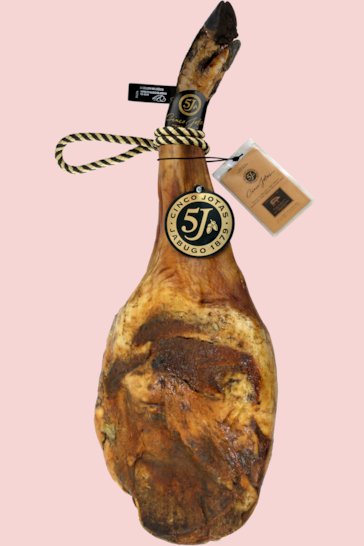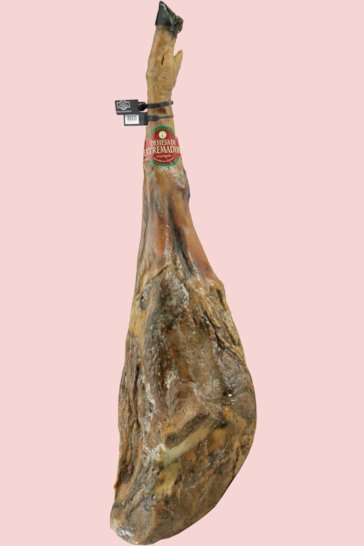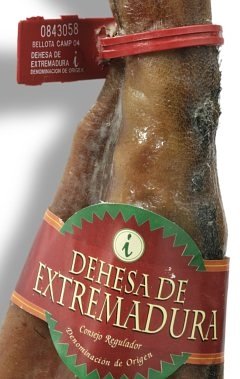UK deliveries: 5-7 days, all customs expenses (~£21) are charged in advance (no extra payment upon receival)
On the Internet you can buy top quality Spanish hams from highly reputable producers, with the same guarantees you would get from a brick-and-mortar shop. All that is needed is to find a reliable supplier, and obtain the necessary information on payment terms.
Internet is a resource that offers customers many advantages. It is easy to check and compare product prices and characteristics, and it is convenient: you do it from the comfort of your chair and your purchase is delivered to your door.
However, you can't actually see the product, or take it home you. In other words, you can't control the most important part of the process: product selection and transport. There is also a widespread belief that payment over the Internet is not as secure as in a brick-and-mortar shop.
The information we provide you with below is intended to help you safely buy a premium Serrano ham online, but if you have any further questions please don't hesitate to contact us. We will be happy to help.
Iberico hams are characteristically long and slender, with a dark-coloured hoof. It is important that photos of the product show these features, and if the ham delivered to you does not meet your expectations you should have the option of returning it.
Another feature that should appear in photos is the band of the Producers' Association of the Designation of Origin. In the Dehesa de Extremadura Designation of Origin, Ibérico pigs that consume a diet of acorns and grasses during the finishing period bear a red band, and a seal with an individual code identifying them as "Bellota Campo" (free-range "bellota" quality).
Once the jamon has been delivered you should check to see that the colour of the meat is between rosy and purplish red, its texture is smooth and not fibrous, and that the fat is glistening, fluid and soft to the touch. If the ham you receive does not meet these characteristics and you are dissatisfied, you should be able to return it.
Brand, however, is not the best indicator of ham quality. There are producers that have earned a name for themselves in the course of more than 100 years, and there are others that have simply invested a lot in advertising. There are also small, artesanal producers such as those that supply IberGour, whose brands are not likely to become well known because their production is only a few thousand hams each year.
Consequently, if you are unfamiliar with the producer it is best to go by the certification of the Producers' Association of the Designation of Origin.
The shops that you trust have earned that confidence year after year, providing quality products and seamless service. Similarly, you should be able to obtain a guarantee of quality when buying from a shop online. This guarantee should include such aspects as:
As a safety measure, print the page confirming your purchase, and save copies of all e-mails received from the vendor.
In the case of food products, the law does not require the seller to accept returns if the item is already started. Since it is impossible to know if a jamon is too salty or tastes bad without starting it, we recommend that you purchase only in shops where the return policies are most favourable.
It is best to be sure by reading the return policy, which should be visible on the website. If it is not there or is not sufficiently clear and explicit, we recommend you look for another place to buy or request the information by email before placing an order, so you will have it in writing. Do not trust shops warning that the jamon cannot be returned. To avoid surprises, the terms for accepting or not accepting returns should be very clearly stated, along with information on who will pay the cost of shipping returns, deadline for requesting a return, etc.
Some products, such as wine and perishable goods, must be transported under special conditions to avoid damage and to ensure they arrive in good condition. It is essential that the online shop provide information about packaging and shipping conditions, as well as estimated delivery time.
El jamón no es especialmente frágil ni sensible a las condiciones de transporte, a no ser que el usuario lo haya pedido pelado (sin la corteza). De todas formas, para que nos llegue en condiciones óptimas es necesario que venga dentro de una funda de ropa y en una caja, que puede ser de madera o de cartón. En cualquier caso, el embalaje tiene que llegarnos intacto.
En cuanto a la empresa transportista, el hecho de que sea conocida no es una garantía suficiente, así que hay que confiar en que la tienda haya hecho una buena elección. De todas formas, cualquier anomalía en el paquete recibido debe ser reportada al comercio para que actúe en consecuencia, reponiendo el producto o devolviendo el importe de la compra.
Los comercios más serios informan, por teléfono o e-mail, del momento en el que sale la mercancía de sus almacenes. Esto permite a los usuarios calcular el tiempo que tardará en tener el jamón en casa, que no será más tarde de 3 o 4 días en la Península Ibérica, ni más de 10 en el resto de destinaciones.


